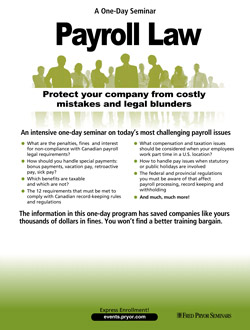As a payroll professional, you can’t afford to make mistakes.
Are you fully versed in the rules, record-keeping policies, withholding regulations and labour standards affecting payroll processing? Are you up-to-date on the government’s latest changes, amendments and requirements? Even seasoned payroll pros may find themselves needing a refresher and if you are just getting started in the field, navigating the finer points of payroll law can easily become an exercise in frustration.
Attend this information-packed seminar and gain a thorough understanding of Ontario's Payroll Law, including employment and labour standards that affect payroll processing, withholdings, garnishments and deductions, the role of Federal and Provincial government regulations, special concerns involving the U.S. and much more.
<!--read more-->
An intensive one-day seminar on today’s most challenging payroll issues
- What are the penalties, fines and interest for non-compliance with Canadian payroll legal requirements?
- How should you handle special payments: bonus payments, vacation pay, retroactive pay, sick pay?
- Which benefits are taxable and which are not?
- The 12 requirements that must be met to comply with Canadian record-keeping rules and regulations
- What compensation and taxation issues should be considered when your employees work part time in a U.S. location?
- How to handle pay issues when statutory or public holidays are involved
- The federal and provincial regulations you must be aware of that affect payroll processing, record keeping and withholding
